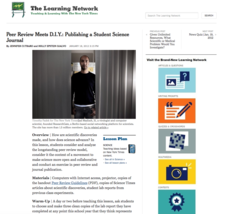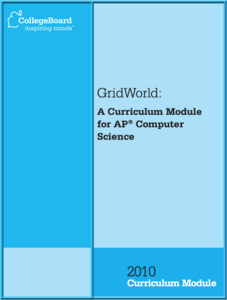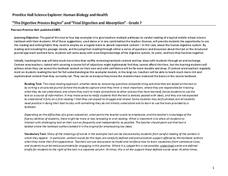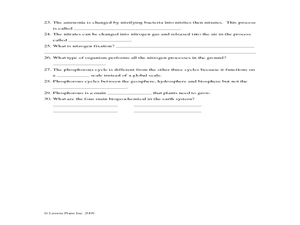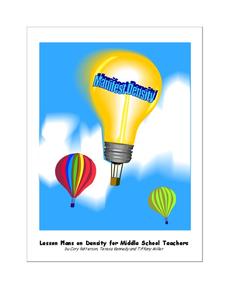Curated OER
Teaching Science Process Skills
Teaching science process skills is a vital part of helping students become good scientists.
Serendip
Carbohydrate Consumption, Athletic Performance and Health – Using Science Process Skills to Understand the Evidence
Should athletes carb load before an event or consume carbohydrates during the competition? Scholars discuss how to set up a hypothesis and experiment to answer a question relating carbohydrates and athletic performance. Then, they read...
Curated OER
Peer Review Meets D.I.Y.: Publishing a Student Science Journal
Peer review of science laboratory reports? You bet! First, learners work in pairs to review a scientific article. Then they trade lab reports for peer review. The end result is the publication of a classroom scientific journal!
College Board
GridWorld: A Curriculum Module for Computer Science
Stretch out the grid. Teaching modules provide suggestions on how to use the case study, GridWorld, throughout the year as opposed to only right before the exam. The instructional units provide suggestions for presentations, assignments,...
Savvas Learning
"The Digestive Process Begins" and "Final Digestion and Absorption"
Want your class to digest text more thoroughly? Middle schoolers learn about the digestive system in the lesson and reinforce informational text reading skills through a variety of strategies. They engage in a close reading approach,...
Curated OER
What is the Nature of Science?
Conduct a survey about the nature of science with your high schoolers. They will record their responses in a table and then discuss the implications of scientific theory. Note: There are activity sheets, and forms included with this lesson.
Community Resources for Science
"5 E's" Science Planning Worksheet
This two-page planning guide walks you through a five-part process for teaching scientific content. To begin, decide how you will evaluate learners' progress, then what tools you will use to engage them in the topic. Plan how they will...
Intel
Starquest
Almost every ancient culture observed the stars and saw pictures in the patterns. Studying stars allowed them to guide travelers, determine when to plant crops, when to harvest food, and the stories surrounding the images include some of...
Royal Society of Chemistry
Equilibria—Gifted and Talented Chemistry
Teaching is a balancing act! Keep things on an even keel with a comprehensive equilibrium lesson plan. The resource covers reversible and irreversible reactions, Le Chatelier's Principle, and the industrial applications of equilibrium...
Teach Engineering
Processes on Complex Networks
Introduces your class to random processes in networks with an activity that uses information about disease spread using the susceptible, infectious, resistant (SIR) model. Participants determine whether a susceptible person becomes...
Intel
Forensics: Get a Clue
Although the methods are all scientific, forensic science was started by police officers rather than scientists, who relied on observation and common sense. Young detectives use many tools to solve crimes around the school in a...
Curated OER
Bacterial Transformation - Biology Teaching Thesis
Students explain the following processes: bacteria transformation, genetic recombination, and antibacterial breakdown of bacteria. They follow lab protocol and use the scientific method: to make predications, and to explain an unexpected...
Discovery Education
Clutter Cutter
Challenge young learners to cut the clutter with this fun engineering project. As employees of a home and office supply company, young engineers are asked to develop devices that organize everyday items. After participating in a...
National Center for Case Study Teaching in Science
A Case Study Involving Influenza and the Influenza Vaccine
Using a hypothetical discussion between two coworkers broken up into four parts, budding biologists examine the flu shot and some of the typical arguments for and against it. The conversational nature of the reading makes it engaging and...
Curated OER
Biogeochemical Cycles Study Guide
The four cycles in Earth's biogeochemical system are covered in this learning exercise. Science stars fill in the blanks or define vocabulary terms pertaining to the hydrologic, carbon, nitrogen, and phosphorous cycles. This resource...
Lerner Publishing
Teaching Habitats
What makes up a habitat? Use this resource to engage first graders in the exploration of desert, wetland, forest, and ocean habitats. Youngsters classify plants and animals into the four distinct habitats through drawings and cutting and...
Curated OER
Digestion & Nutrition: a Case Study
Students explore digestion/nutrition and utilize scientific investigation skills. They complete meal logs for several days and graph their results. After analyzing their data, they write formal lab reports.
Virginia Department of Education
Current Applications in Science
High schoolers may claim to have no interest in scientific revelations and discoveries, but watch how quickly they download a new app onto their state-of-the-art smartphones. Scholars discuss the scientific or technological breakthrough...
Curated OER
Science is a Wonderland
Students use the scientific method to study Animalia and Plantae Kingdoms. In this science inquiry lesson, students watch a PowerPoint about science process skills. Students complete the National Geographic bottled Eggs-periment or the...
Curated OER
Lesson Idea: A Box Full of Science
Students analyze and study a shoe box of simple objects. They experience a homemade alternative to a company box of commercial kits for science. Each student creates their own shoe box of simple objects to share with their classmates.
Purdue University
Design of a Door Alarm
How does electricity work? Budding scientists explore the concepts of electrical currents and open and closed circuits with class discussion and a hands-on activity using a battery to turn on a light bulb. Learners also make predictions...
University of Southern Indiana
Manifest Density
There's a lot content packed into the four lessons of this physical science unit on density. From salad dressing to the water cycle and hot air balloons, these lessons engage students in hands-on activities that explore real-world...
NASA
Freshwater Availability Classroom Activity
This science assignment produced by NASA teaches inquiring minds the distribution of Earth's water. Learners will appreciate and understand the importance of fresh water and how weather and climate affects everything.
Towson University
Mystery Tubes
How do scientists know they're right? Truth be told, they don't always know. Explore the scientific process using mystery tubes in an insightful activity. Young scientists discover how to approach and solve problems in science, how ideas...




